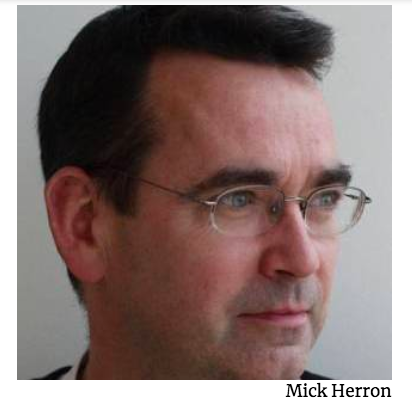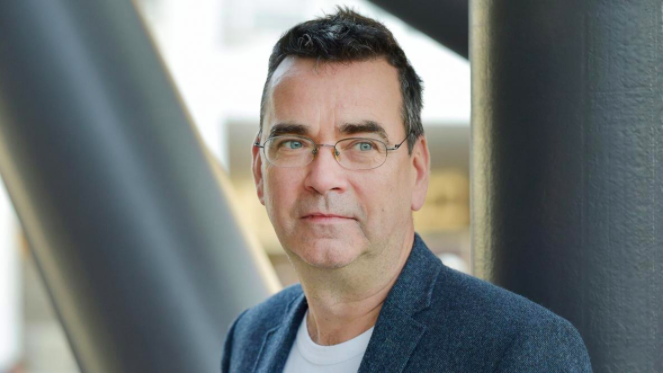Planning a novel: A conversation with Mick Herron.
Mick Herron is the award-winning author of the bestselling Slough House series of witty spy novels, which has been made into an Apple TV+ series, Slow Horses, starring Gary Oldman and Kristen Scott-Thomas. Herron is widely considered the John Le Carré of his generation.
We talked about how we plan, or don’t plan, our books.

How much should you plan a novel before you start?
LA: I always thought you had to have an idea that included a beginning, middle and end before you started writing a novel. It took me years to work out that this isn’t the case. All four of my novels have evolved from the vaguest of nuggets – a place, a character, something I’m just weirdly interested in (eg. killer whales or beetles or priest’s holes). The end result has been almost unrecognisable from the first idea. Is this something you find too? I have a feeling you might set out with a bit more of a road map than I do?
MH: More like a sat nav: I ask for a destination, and it takes me on a route of its own devising. I was remembering a line from the movie Sunset Boulevard the other day – it’s a long time since I’ve seen it, but the line’s delivered by the screenwriter character, played by William Holden, and goes something like “The most beautiful script I ever wrote was all about Okies in the Dust Bowl. By the time it reached the screen, it was set in a lifeboat.” He was complaining about the iniquities faced by the writer in Hollywood, but it strikes me that it’s not such a bad image of the creative process, and the way the original idea behind a novel – say – can become transformed or even discarded in the course of the book’s being written. I’m thinking of some of the talks we had when you were first planning Magpie Lane. A lot of those original ideas never made it to the final page, but they remain part of that novel inasmuch as they were necessary to its creation.
LA: Yes, I’m trying to figure out how it all does develop without a plan. I think I tend to get interested in a setting, and then find the character’s voices (with Magpie Lane I spent 5-6 months rewriting the first five chapters till I got Dee’s voice). Then I’ll start researching a few bizarre things that fascinate me – in this case, I remember getting very into wallpaper restoration and Oxford’s secret graveyards. I don’t write chronologically. I think I generally stay one small step ahead of myself, but often something will become really interesting to me, and then I’ll find it turning into a whole section, or even a bigger theme, and the whole novel shifts and goes in a different direction. This means I expand the book from within. For a long time the opening line of Magpie Lane was: ’That was the day I found her in the priest’s hole eating dead bees.’ Now that’s at the start of Chapter 18.
MH: And a very striking line it is too – I remember thinking it should be slapped on the front cover to pull readers in . . . I’m with you on character being key to a novel’s development, but I’ve also found, over and above that, that every novel has its own voice, even when it’s being written as part of a series. The mood, the tone, the colouring, has to be distinct from what’s gone before. Writing standalone books, as you do, requires even more of a tonal shift, and these ‘bizarre’ interests you follow help you achieve that, both in Magpie Lane and The Night Visitor. I love it when authors invest their books with unexpected enthusiasms, whether that’s old wallpaper or exotic beetles or whatever, and when such interests are seamlessly integrated into the storytelling, the results can dazzle. I assume that the development of such ideas in itself helps shape the novel, pointing out directions that didn’t seem available at the outset?
LA: Yes, it definitely does. I think it really leads the way. So, what about you? You don’t think of a plot in advance, but you know the destination. How does that actually work when you sit at your computer each day? Do you have a sense of a scene you want to write next? How do you actually progress? I’m also interested in how different it must be when you’re deeply familiar with characters from the outset. Do you feel they have a life of their own?
MH: Not a life of their own, exactly – I find I still have to do all the work – but their paper-bound existences do at least have defined parameters: I know what sort of things they might do, what things they might say. So that helps. As for plotting, I do as much as I can before starting to write, but that falls far short of being an actual detailed outline. It’s more a series of disconnected events, like an overlong trailer for a movie. In doing the writing, I find the connections (I hope). The daily work often feels like looking for the solution to a problem I had no idea existed before then, which is sometimes trivial (where is this character’s car parked?) and sometimes not (how does this character know this other character is lying?) It’s not that I prefer to work this way; it’s more that this is the only way I seem able to (with this series, anyway). Is it like that for you? Or do you feel you have choices?
LA: I generally feel like things are wide open. The strange thing is that as I try to answer these questions, I realise how little of my writing happens in the conscious brain. It’s all a bit hazy. A lot of it is about sitting down, day after day – getting past my self-doubt, and the intimidating fact of this blank page – and playing around, watching scenes take shape. This doesn’t seem to happen in my conscious mind. This is going to sound totally pretentious, but when it’s really working well it’s a bit like what I imagine lucid dreaming would be like – I’m kind of steering, but not in control. The serious, conscious work happens later in the process when I have to tighten it all up, and think hard about plot, and what information is revealed, and when, and the logistics of it all – those parked cars.
MH: And there’s the elephant in the room . . .the degree to which we don’t actually know what we’re doing; or, more accurately, how we’re doing what we’re doing. A lot of the problem-solving, I find, goes on in the back of the brain – if the plot mechanics are seizing up, I don’t sit at my desk and force myself to focus, I go out for a walk. By the time I get back, I’ve generally found how to get things going again. This sounds oddly passive, but I’m sure it’s common to many writers. All the really hard work has long since been done by the time we pick up our pens. We were doing it without knowing it: it started when we picked up our first story books, without a parent or teacher there to put it in our hands.
Or it started when we put those books down, and let the story continue in our heads. . .

Leave a comment